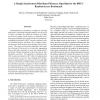389 search results - page 14 / 78 » Computational Alternatives to Random Number Generators |
ADHOCNOW
2004
Springer
14 years 2 months ago
2004
Springer
Topology control is the problem of assigning transmission power values to the nodes of an ad hoc network so that the induced graph satisfies some specified property. The most fun...
PAMI
2010
13 years 7 months ago
2010
—This paper addresses the problem of self-validated labeling of Markov random fields (MRFs), namely to optimize an MRF with unknown number of labels. We present graduated graph c...
EUC
2007
Springer
14 years 2 months ago
2007
Springer
Abstract. Key pre-distribution schemes are a favored solution for establishing secure communication in sensor networks. Often viewed as the safest way to bootstrap trust, the main ...
CVBIA
2005
Springer
14 years 2 months ago
2005
Springer
Abstract. Markov Random Fields (MRFs) are a popular and wellmotivated model for many medical image processing tasks such as segmentation. Discriminative Random Fields (DRFs), a dis...
CLUSTER
2006
IEEE
14 years 2 months ago
2006
IEEE
The RandomAccess benchmark as defined by the High Performance Computing Challenge (HPCC) tests the speed at which a machine can update the elements of a table spread across globa...

